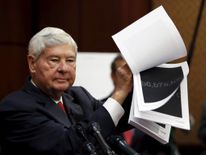Thousands of people have taken to the streets to express their support for President Erdogan after an attempted coup in Turkey, with officials warning "it is too soon to say that the danger is over".
Crowds have gathered outside the country's parliament, where demonstrators have been demanding for the death penalty to be reintroduced and imposed on those who plotted the unrest.
"We got your message. The necessary will be done," prime minister Binali Yildrim told the protesters. Capital punishment was scrapped in Turkey more than 10 years ago.
At least 161 people were killed and 1,440 injured as they tried to thwart the takeover, and it is also believed that more than 100 "coup plotters" have died. The death toll has not been updated for many hours.
Defence minister Fikri Isik has said the Turkish government is in full control of all areas in the country, but stressed that "at any time there could be new tests and new attempts" to impose martial law.
More than 2,800 military personnel, soldiers and high-ranking officers among them, have been arrested in connection with the attempted coup.
Turkey's four main political parties held an extraordinary parliamentary meeting on Saturday, and issued a joint statement strongly condemning the coup.
President Recep Tayyip Erdogan has asked the United States to extradite Fethullah Gulen, a Muslim cleric exiled in Pennsylvania who is accused of masterminding the plot.
US Secretary of State John Kerry has said his country will entertain the extradition request if evidence of Mr Gulen's wrongdoing withstands scrutiny.
Mr Gulen has denied any involvement and says he condemns the attempted coup "in the strongest terms".
Countries around the world, including Germany, Italy and Russia, have said Turkey's democratic institutions must be respected, but stressed that the bloodshed and violence on the streets must come to an end.
Activity at airports in Istanbul and Ankara is beginning to return to normal, but flights from the US and the UK remain cancelled, with British Airways hoping to offer a "reduced schedule" on Sunday.
The closure of Turkish airspace has also affected military operations at Incirlik airbase in southern Turkey, with the Pentagon confirming that US warplanes have suspended flying missions against IS in Iraq and Syria.
Mr Erdogan has condemned the uprising as an act of "treason", and has insisted that the attempted coup was carried out by a small minority within Turkey's army.
Appearing relaxed, he told crowds in Istanbul: "The army is ours, not of that parallel structure. I am chief commander."
At one stage on Friday evening, Mr Erdogan had conducted an extraordinary TV interview, in which he addressed the nation from a mobile phone held up by the presenter.
Aerial attacks, explosions and gunfire had ripped through Istanbul and Ankara throughout the night, and at one point, two television stations were taken off the air after being stormed by the military.
Foreign Secretary Boris Johnson says he has spoken to his Turkish counterpart and underlined the UK's support for Turkey's democratically elected government.





